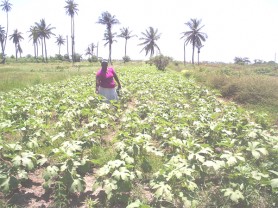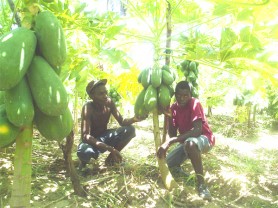Like other Dochfour farmers, single mother Omwattie Manooj wakes early to work in her small farm in the cool of the day. These days she, like the others, is uncertain about their future and upset that the land they till is going to be taken away with no alternative offered as yet.

But Housing Minister Irfaan Ali says that the portion of land at the front of Hope Estate, East Coast Demerara belongs to the Ministry and the Dochfour farmers have been “illegally” occupying the land. That portion is slated to be developed into a housing scheme. Farmers have been notified of the decision but they say that no alternative have been identified for them to continue their farming and the authorities seem not care. Manager of the Hope
Estate Ravindra Persaud said that the farmers have been “farming at their own risk.”
Last week, several upset farmers told Stabroek News that they have been farming the area since 1989. They said that they had been informed that the portion had been given to the Housing Ministry for a housing scheme and, on July 27, they were invited to a meeting with Ali at the Ministry. However, he never showed up and they left after hours of waiting. The invitation letter had been signed by Chief Executive Officer of the Central Housing and Planning Authority, Myrna Pitt. According to the farmers, officials promised to contact them but never did.
Ali, when contacted, said that a meeting had not yet been re-scheduled but this will be done at least by the end of this week. He declared that the land was transported land belonging to the Ministry and it is “absolutely not true” that the farmers have been occupying the land since 1989. He asserted that they had been illegally occupying it. According to the Minister, the investment in that area is delayed as the farmers have asked for time for their crops to be reaped. Further, he said that the contract to clear the land was supposed to have been completed six months ago.
‘This does maintain we’
But the farmers say that they are in the “middle of the ocean” and are unsure of what is going

to happen to them. About 14 cultivate the plot of land and they said that they have been advised to stop planting but with farming their only means of livelihood and school re-opening soon, they want answers.
The farmers suggested that the portion they cultivate now be left alone pointing out that there is still a large portion of land where the scheme can be extended.
Sewraj Balmik said that he has been cultivating that particular portion of land since 1989 and along with the others had dug drains and built up the land. “This does maintain we,” he explained, adding that they had no one else who would take care of them. “After they tek here what we go do?” The farmers asserted that no one had even said what will happen to them in terms of accessing land and declared that that no one is representing them.
Ali, when questioned as to whether his ministry will be assisting the farmers in acquiring new land, said that it was a matter for the Ministry of Agriculture. He later said that the manager of the Hope Estate had indicated his willingness to help them acquire new farmlands but “they don’t want that.”
Rahaman Samad cultivates several thousand papaw plants-which are bearing-as well as cherry, golden apple and other fruit trees on a plot. He said that he was told to stop planting by representatives of the Hope Estate. According to the farmer, they were told that the land had been handed over to the Housing Ministry for several years now.
He recalled farmers visiting the Ministry of Agriculture in an effort to see Minister Robert Persaud, but never met with him. However, he said, officials there told them that they could do nothing. “This is our livelihood they playing with here,” he stated.
In one section of the land in question, coconut trees had been cut down and in some areas the grass has been sprayed. Samad employs several persons and said that he had invested a lot of money in his farm. He said that it is major source of income and officials have not said whether they will even be assisting them. He said that the famers wanted officials to visit and see what is happening.
‘Destroying life’
One of Samad’s employees, Joe Adams, 21, told Stabroek News that he had been working with Samad since he left school and farming is all he knows. He is the breadwinner for his home and supports his mother and siblings, Adams said. He described the situation as “just like destroying a man life.”
According to the farmers, in previous years, they paid rent to the Hope Estate, but the late Agriculture Minister Satyadeow Sawh intervened and had agreed that if they maintain the drains and keep the “head-row” clean, they would not have to pay. Additionally, they said, when they are affected by flooding, they are not compensated and so there was an understanding between them and the estate in terms of rent.
But according to Estate manager Persaud, there was no record of the farmers paying any rent and as far as he was aware, management had been told to desist from collecting any rent from them. He cautioned that he had only landed the job in December last year and was not in a position to make a pronouncement on the issue. From his information, he said, the farmers had been given notice to move, which they have acknowledged. Persaud said that they have been told not to cultivate the land since it was allocated to the Ministry of Housing when now education minister, Shaik Baksh was responsible for the sector. He declared that they had been “farming at their own risk.”
But it is their uncertain future that has the farmers worried. Manooj supports her sons, both of whom attend school and says that she has been farming her portion for years, even before she got married. “Me nah do nothing more for living, just dah alone,” said the woman, who plants cash crops such as okra and pakchoy. “What me gon do, who me gon go wuk with?” she queried. “They want destroy this and tell you to grow more,” she said noting that when her sons are at school, she usually works alone and because the land is not far from her home, she is not afraid. If she has to move to the backlands, she says, she will not feel safe and like the other farmers she believes that they should be allowed to remain in the portion they now farm.








